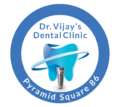CHILD DENTISTRY
YOUR CHILD’S TEETH CARE
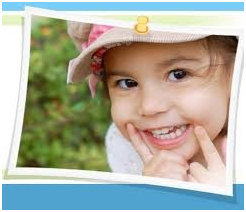
Healthy teeth are important to your child’s overall health. Forming good habits at a young age can help your child have healthy teeth for life. From the time your child is born, there are things you can do to promote healthy teeth. It is recommended that a dental visit should occur between shortly after the presence of the first tooth in a child to that child’s first birthday. This is because early mouth examinations aids in the detection of the early stages of tooth decay and can therefore be immediately treated. Our dental care clinic believes that disease can be prevented with adapting healthy oral habits and precautions. Our dental care centre aims to provide the best dental care available to secure your child’s dental health. Healthy
baby teeth are important for eating, smiling, talking and keeping a place for adult teeth. Healthy dental habits help avoid tooth decay and promote good general health.CHILDREN’S TEETH AND BRUSHING
WHAT ARE THE MILK TEETH?
Teeth present in children are called as Milk teeth. They are called so due to their white color which resembles the color of milk. The milk teeth are whiter than the permanent teeth which replace them. The refractive index of milk teeth is similar to that of milk and hence they are called milk teeth.WHAT ARE NATAL AND NEONATAL TEETH?
Teeth that are seen at birth are called natal teeth while teeth that appear within a month of birth are called neonatal teeth. These teeth are retained unless they are very mobile or pose major problems in nursing.AT WHAT AGE DO THE MILK TEETH FALL OFF?

All the milk teeth erupt by 3 years of age. The milk teeth are shed from 6 years onwards till about 10 years of age. The permanent teeth appear by 6 years of age. Between the ages of 6 – 9 years the child has some milk teeth as well as some permanent teeth This period is called the mixed dentition period. By about 12 years all the milk teeth should be shed off and replaced by the permanent teeth.
WHY DO MILK TEETH BECOME MOBILE?
As the permanent teeth start emerging they wear off the roots of the milk teeth. Thus the milk teeth loose their support in the bone and become mobile. The milk teeth are ultimately shed off and are replaced by the permanent teeth.ARE SPACES BETWEEN TEETH NORMAL IN CHILDREN?
It is normal to find the milk teeth in children to be spaced. These spaces between the teeth help later in accommodating the bigger permanent teeth. Thus absence of spaces between the milk teeth in children may be a fore warning that the child may not have adequate space to accommodate the bigger permanent teeth which may erupt in a crowded teeth.WHAT TYPE OF TOOTHBRUSH?
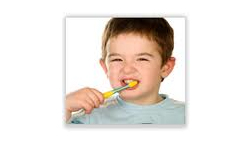
The toothbrush that you decide to use for your child should be small enough to fit comfortably into your child’s mouth and should also have soft bristles.
THOROUGH TOOTH BRUSHING

Make sure they brush all teeth surfaces and their tongue, too. Toothpaste is not required, but may be used if it will encourage your kids to brush longer or to increase the likelihood of brushing for a child who does not take to the routine
TOOTHPASTE CHECK
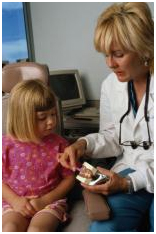
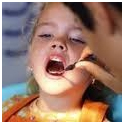
Make sure any toothpaste that is given to a child is made for kids. If you use toothpaste, only a pea sized dab of toothpaste is needed to help clean teeth and remove plaque. Toothbrush Maintenance It is recommended to replace a toothbrush about every three months or when the bristles become spread out. It is also a good idea to change toothbrushes after a cold or other illness.
FIRST CHILD’S VISIT TO DENTIST
The American Academy of Paediatric Dentistry states that children should see a dentist when they get their first tooth and not later than 1 year of age../p> However, an early visit to the dentist is a good way to learn proper oral hygiene at an early age, including avoiding nighttime bottles or cups of formula or juice, proper tooth brushing, and a diet that promotes good dental health.NURSING BOTTLE CARIES/SYNDROME
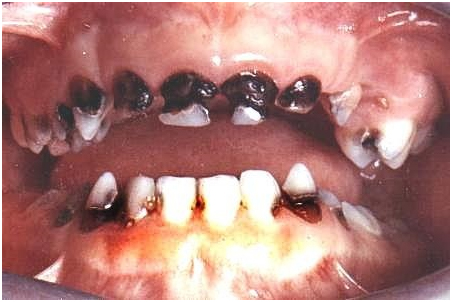
Nursing bottle syndrome (most recently called Early Childhood Caries–ECC)is characterized by children, generally under the age of 3 who are put to bed with a baby bottle filled, usually with fruit juice or sweetened milk. (NOTE: Fruit juice is a MAJOR factor in the development of early childhood caries!) The pattern is severe decay of the front top teeth. If the bottle contained only water, or an artificially sweetened drink such as Crystal Lite or artificially sweetened Kool-Aid, the teeth would not be affected. No mom does this on purpose to her child, but it is quite common because mom simply doesn’t know that the sugar in the bottle can do this
WHEN SHOULD A CHILD STOP USING A BOTTLE?
A child should be weaned from the bottle by 12 to 14 months of age.LOW RADIATION DIGITAL RADIOGRAPHS FOR CHILDREN
NEW LOW RADIATION DIGITAL X-RAY CENTER MAKES DENTAL X-RAYS FAST, EASY AND SAFER THAN EVER!
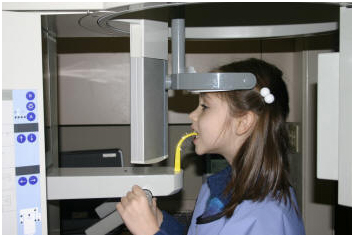
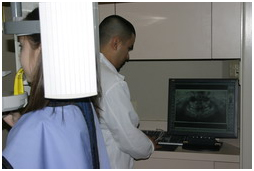
Low Dose Digital X-rays are the newest improvement in dental diagnostic imaging. Now your child can have their dental x-rays done electronically, almost instantly appearing on our computer screen, with up to 75% less radiation. The benefit to our patients is that you would need eight years of these new state-of-the-art low dose digital x-rays to equal one year of the regular dental x-rays. The x-rays are also better because we can optimize the
brightness and contrast, as well as enlarge them for easier viewing. High Tech, Low Dose Digital X-rays give instant x-ray examination and diagnosis and require up to 75% less radiation for the patient This low dose digital x-rays are just one more example of our commitment to bringing the best of dentistry to our patientsNEW HIGH TECHNOLOGY DENTAL X-RAYS ELIMINATE THE NEED FOR X-RAY FILMS IN YOUR CHILD’S MOUTH FOR MORE COMFORT
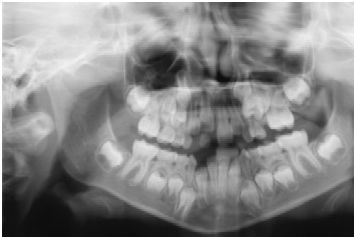
Digital panoramic x-ray shows both the baby teeth in the patient’s mouth as well as the new permanent teeth that are still developing in the jaw bone under the gum line. Low dose digital x-ray lets the dentist evaluate the child to be sure that the permanent teeth are growing properly. You can see how the baby teeth are important for chewing and are holding the place for the permanent teeth so that they can come in at the proper time.

Finally For all children, you should
- Brush teeth with a fluoride toothpaste
- Provide healthy foods and limit sweet snacks and drinks
- Provide low-fat milk and dairy products high in calcium
- Schedule regular dental check-ups
